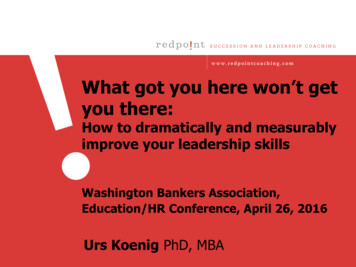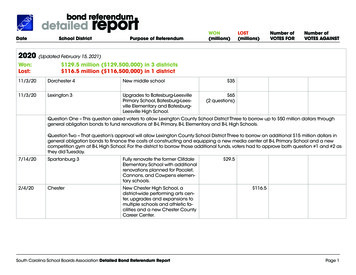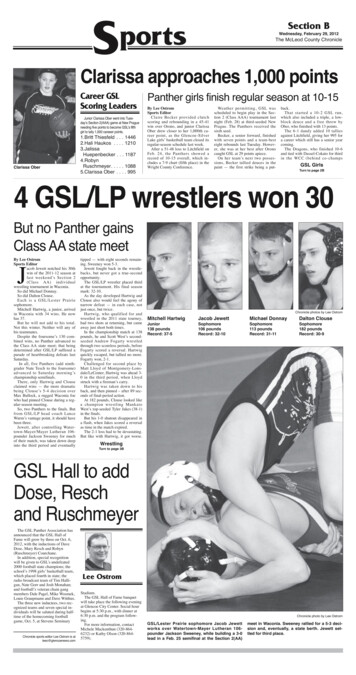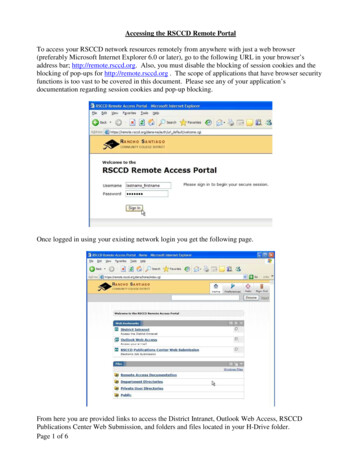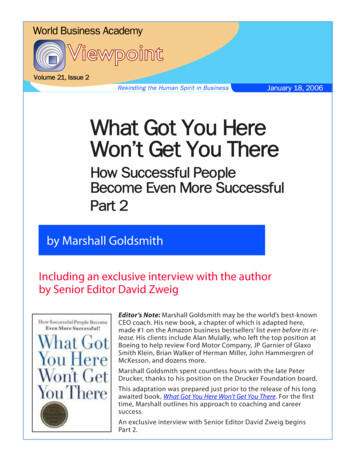
Transcription
Volume 21, Issue 2January 18, 2006What Got You HereWon’t Get You ThereHow Successful PeopleBecome Even More SuccessfulPart 2by Marshall GoldsmithIncluding an exclusive interview with the authorby Senior Editor David ZweigEditor’s Note: Marshall Goldsmith may be the world’s best-knownCEO coach. His new book, a chapter of which is adapted here,made #1 on the Amazon business bestsellers’ list even before its release. His clients include Alan Mulally, who left the top position atBoeing to help review Ford Motor Company, JP Garnier of GlaxoSmith Klein, Brian Walker of Herman Miller, John Hammergren ofMcKesson, and dozens more.Marshall Goldsmith spent countless hours with the late PeterDrucker, thanks to his position on the Drucker Foundation board.This adaptation was prepared just prior to the release of his longawaited book, What Got You Here Won’t Get You There. For the firsttime, Marshall outlines his approach to coaching and career success.An exclusive interview with Senior Editor David Zweig beginsPart 2.
One thingthat hasreallychangedis timepressure.If you had only a sentence or two to acquaint our readers with your new bookand your practice, what would you tell them?What I do is not mystical. It is eminently practical. A lot of people have trouble believing that what I do is actually as simple as what it is. It’s very simple.The book is a good reader on what I do and how I do it. At the end of thebook you should have a pretty clear grasp of what I do and how, as well asmany case studies of executives.When you look back on your clients over the years, in terms of the 20 habits thatget people in trouble, how do you see the stresses and demands of executive lifehave shifted in recent times?One thing that has really changed is time pressure. In the early ‘80s I workedfor IBM and you could go to Armonk, NY at five o’clock and shoot a cannonball down the hall and hit no one. The place was empty. People worked 35 or40 hours a week and they took four or five weeks’ vacation. It was my opinion that corporate people were basically lazy. Today corporate people worktheir butts off. The major change that has increased is just the huge increasein competitive pressure at all levels.People talk about, for example, the increase in CEO compensation. Whatthey don’t think about is, there has been increasing compensation at everyprofessional level. Not so much at the worker level, but at every professionaland managerial level between the worker and CEO. Number one, the carrothas gotten bigger and better in terms of compensation for winning. Numbertwo, the insecurity, the punishment for losing, has gotten bigger and bigger.In the old days, for example, according to a study I did in IBM one year, statistically almost no one in that whole company out of hundreds of thousandsof employees was fired for performance reasons. Nobody! I mean 0.01 percent. It was a ridiculously small amount.People would get fired if they lied, cheated, stole, or violated ethics. But ifyou wore a white shirt and showed up every day, and you roughly did yourjob at any kind of level of competence, you didn’t get fired. Those days aregone. Today, corporate people face much more insecurity.I think what you’re seeing happen at all levels of the company is just a muchgreater sense of work ethic, competitive pressure. It’s tough out there. It’snot so much that the problems are different, it’s that they’re squared. Theyare much more intense. The pressure to win is much greater, the time pressure is greater. The hyperactivity is much greater. The overcommitment ismuch greater than it’s ever been.You frequently reference in the book something much like “work-life balance” Today it’s much more of an issue than it was in the past.Are you running into much more resistance, people who say, “I can’t get off thetreadmill!”?
Not as much as you might think because the reality is, today, you have nochoice. Today many more people are afraid. There is a fear level that is muchhigher. The job insecurity is much higher. The certainty of getting a betterjob someplace else is pretty low. So people who are making large sums ofmoney tend to be more insecure than they used to be.And also, there is no free pass anymore from the press at the CEO level.Today, if anything, the press is just out there to get you. At least the business press in the past was much kinder to executives. The local press wasmuch kinder to executives. If you’re in the town, they tended to give you thebenefit of the doubt. Those days are gone. The press is just pounding peopletoday. The degree of competitive pressure is much higher at all levels than ithas ever been.What has happened to the idea of being “in control”?You aren’t in control. One of the keys is being able just to let go of that. Letgo of the need to always win; let go of the need to be right; let go of theneed to control things because the reality is, if you manage knowledgeworkers, they know more about what they’re doing than you do. You can’ttell them what to do and how to do it. Remember Drucker’s quote: “Theleader of the past knows how to tell. The leader of the future knows how toask.” We’re living in an entirely different time.What I talk about in the book is kind of a prescription. It’s a prescription toget into the habit of asking people for input, listening, apologizing for previous sins, involving everyone around you in getting better, following up, andpracticing feed-forward. It’s a prescription for how to change your behavior.I did a research study with 86,000 people, that’s quoted in the book, thatshows if you do the stuff I teach, it works. It just doesn’t work if you don’t doit. People who practice this stuff on a regular basis just get better. You can’targue with it. One of my clients I just finished with this week CFO of a bigcompany and he showed spectacular improvement. On a minus-five to plusfive scale after a year and a half, one person gave him a plus-two; everyoneelse was plus-three or plus-four. They don’t give much of anybody a plusfive. His scores were basically as high as you can expect. And the reality isthat most people thought I would never get paid.What were the biggest things that he learned that made the difference?He was incredibly impatient, insensitive, hyperactive, barking at people, always being right. What he learned is, calm down, breathe, work with people,involve them, figure out who you want to work with and who you don’t wantto work with. If you don’t want to work with somebody and it’s not going towork out, get rid of ‘em. If you’re going to work with people, treat them likeadults.In middle management, people climb up and it dawns on some that they haveto get things done through people at higher levels.What happens is, again, it’s almost never a matter of bad intentions. I don’twork with anybody who goes to work with the goal of being disrespectful,rude, or insulting to others. People don’t really plan their way around doing
If you readthe wholebook, it’sbasicallyone-on-oneBuddhism.that. A lot of people are just unaware of how their delivery is perceived byeveryone around them.Traditionally, top executives have thought that if the results are good, the peoplewill be OK. Now with the shift in power, more of them are learning that, to getthe results, you have to take care of the people.In the short term it works. But in the long term it doesn’t work. The higher upyou go the less it works. Basically, you are dealing with brilliant people. Youcan’t treat brilliant people like idiots. This is also true in the military. Whenyou are a multi-star admiral, the people you are managing all have graduatedegrees. They all have high IQ’s; they speak multiple languages; these aren’tmorons. You can’t sit there and bark at these people and treat them like idiots. If you do, they are going to leave — they’ll just leave the Navy — and goout and make more money someplace else.I just gave a pilot session to all the new admirals in the Navy. There is astereotype of the military. That stereotype may have some validity if you’rein combat and dealing with privates in the army. But if you’re dealing withmulti-star admirals, you can’t treat people that way. It doesn’t work.We’ve talked a lot about individual transformation. Do you also bring aboutbroader changes in systems?This is how I work as a coach. My whole area is narrowly focused. I don’t dealat all with compensation systems. I am told that you can’t change people’sbehavior if you don’t change their compensation plan, especially investmentbankers and people like that. I work with a lot of people like that. And theyhave achieved huge changes in behavior. I don’t deal with compensation at all.Do you get into their values?To a degree. Here’s where I get into their values. I ask them what they wantto change. If any of them ever wanted to change things that were basicallyinconsistent with what I considered to be appropriate or proper values frommy perspective, I just wouldn’t work with them.I don’t try to convert people. I am in the total non-conversion business. Thereare two types of advice I give people: there’s the required, and that’s prettyclear if you read the book. There is no option. You do it, or I refuse to workwith you. Then there’s optional, which is feed-forward [essentially announcing your proposed change and eliciting support before you embark on anaspect of performance improvement]. And there is no argument either. Ifpeople don’t want to do it, I am not here to judge others. Most of my stuff isBuddhist stuff. If you read the whole book, it’s largely one-on-one Buddhism.That’s what the whole book is.If you listen to what I teach, feed-forward, what is that? Let go of the past.What did Buddha say? “I give you ideas. Only use my ideas if they work in thecontext of your own life.” What do I say? Feed-forward. You ask for ideas andyou only use the ones that fit in the context of our life. Most of the book isBuddhism. It’s letting go of the past. It’s admitting when you do somethingwrong. Apologizing. It’s not getting lost in your own ego.
Are there any clients with whom you cannot work?The only clients I have not worked with are tobacco companies. I’m not hereto judge them either. That’s just my personal values. That didn’t feel right. Idid work with defense companies, though. I do work with the military and Ihave worked with defense companies. I could see how a lot of it is a personalchoice someone of good faith would make, to say that that is bad.As I have grown older, I guess my biggest realization as a coach is to not tryto convince anyone to do anything. I have just been working out with a biginvestment banker. His HR people said, “How do you work with people?” Isaid he will apologize, he will do blah blah blah blah blah. And they said, “Doyou actually expect him to do these things?”I said, “I don’t care. If he does, he works with me, he will.”They said, “What if he wants to work with you and won’t do those things?” Isaid, “I won’t work with him. There are other coaches. It doesn’t bother me.”So I talked with the guy. And he said, “Yeah! I will do this stuff.” I think thereis such fear just to be straight with executives that if you just sit down withthem and say, “Here it is. Will you do this or not?” There such fear that theydo not want to do it. So what? Either they want to do it or they don’t.And then they say, “How do I convince this guy?”I said, “I’m not trying to convince this guy. The guy made 25 million dollarslast year. What the hell am I supposed to do to convince somebody like that?I’m going to convince him he can make another buck? I can’t convince him ofanything. I didn’t make 25 million bucks last year. He made more than I did.Who am I to convince him of anything?”I said, “I’ll talk him. I’ll describe what I do. If he wants to do it, great. And if hedoesn’t want to do it, he doesn’t. It’s okay. It’s not a big deal.”It’s interesting! They were so shocked. I think nobody had ever just laid it outfor them before. Nobody had ever looked at him and said, “If you want to getbetter, do this. Do you want to do it or not? If you don’t want to get better,hell, I don’t care. If you don’t want to change, don’t change.”Here is another thing that is different about what I do. The woman at the NewYorker who wrote the story of my life [Larissa MacFarquahar] basically saidthat I was the least empathetic person that she had ever met her life. Well, ifyou think about coaching, you are always taught to be so empathetic. To me,most of what coaches are trained in, to be empathetic, is condescending. It’sinsulting to people. It’s the ultimate insult. It’s kind of like, “I feel sorry for you.I’m better than you. I’m in touch with your pain.” And all that s---.They’re asking you to be a victim with them.I don’t do any of that. Consider the guy I was dealing with last week. He’sgot 25 million bucks. Last year he made 25 million bucks! I don’t feel sorryfor this guy! I feel sorry for people in Darfur who are getting raped and whoare getting their arms cut off. I went to Africa for nine days during the greatfamine and watched the people starve to death. I feel sorry for them. They’vegot problems! They have real problems. To be honest I don’t feel sorry for The NewYorkermagazinewriter calledme the leastempatheticperson shehad evermet.
AllAmericansknow howto do iswhine.much of anybody in the United States. We don’t know what deprivation evenis in this country. All we know how to do is whine. I don’t feel sorry for mostAmericans because we have never seen people starve to death.The other thing I found out about Americans is that we are not better orworse than other people. So I shouldn’t judge the United States. We are justthe same. When I was in Africa with the famine campaign, people in thenorth of Mali, the country I visited, were starving to death. The people in theSouth ran the government. They hated the people in the north. They hadsold their grandparents into slavery. If we give those people government aid,they would not have given a cent to those people [in the North]. They wouldlet them starve. They don’t care.It’s a tribal issue.Yes. When I came back to the United States to try and raise money for them,do you know what the biggest message I got from the people here was? “It’snot my tribe. We have Americans with problems. Why should we give themanything?” And you know what? We were no better or worse than them. Wewere just as tribal as they were. We were not worse than they were. We wereexactly like they were. “It’s not my tribe.” So it was a very interesting and sobering experience to try to raise money for starving people.When I talked to General [Eric] Shinseki [former Army Chief of Staff ], (andI gave this example in the book), I said, “Maybe I could coach one of yourgenerals.” And he said, “Describe the perfect one.” And I said, “Patriotic, dedicated, driven to achieve, and a stubborn know-it-all.” And he said to me, “Wehave a target-rich environment.”So, I live in a “target-rich environment!” [Laughs].FromWhat Got You Here Won’t Get You There:The Success Delusion, orWhy We Resist ChangeSuccess makes us superstitious. Here’s how.hese four belief systems — that we own the skills, the confidence, themotivation, and the free choice to be successful — make us superstitious.“Not me!” You say. “No way. I don’t buy into that stuff. I’m successful becauseI earned my success.”This may hold true for immature superstitions like stepping on a sidewalkcrack, tossing salt over one’s shoulder, or breaking a mirror. Most of us dismiss superstitions as the silly ideas of primitive and uneducated people. Weassure ourselves, deep down inside, that we are far above these silly notions.Slow down. To some extent, all of us are superstitious. Often, the higher weT
ascend the organizational ladder, the stronger our superstitions become.Psychologists would tell us that superstition arises from the mistaken beliefthat a specific activity which is followed by positive reinforcement is actuallythe cause of that positive reinforcement. The activity itself may be functionalor dysfunctional. It may affect something or someone else, or it may bepointless or self-contained. If something good occurs after we do it, then wecan attribute results to the behavior, and we like to repeat the activity. Psychologist B.F. Skinner performed a famous experiment with hungry pigeonsthat also happens to apply to some corporate CEOs. The pigeons would repeat their twitches because doing so randomly won them small grain pellets.After twitching in a particular way and then immediately receiving food, thepigeons repeated the twitching behavior. They mistakenly connected twitching with food. Twitch, they believed, and they get a pellet. Twitch again, andthey hoped to get another one.It certainly sounds silly. We wouldn’t ever behave this way. Surely we aremore highly evolved than Skinner’s pigeons. In my experience, hungry business people repeat certain behaviors all the time, all day long, after this behavior has been followed by positive reinforcement — even if the behavioritself makes absolutely no sense!Superstition is simply the confusion of causality and correlation. Any humanbeing, just like any animal, tends to repeat behavior that is followed by positive reinforcement. The greater our achievement, the greater our reinforcement — and the more likely we are to repeat the behavior that occurredbefore the reinforcement.The belief in the correlation between behavior and results is sometimes true,but there are often exceptions. That’s where superstition raises its head.Superstition creates the fundamental fallacy that necessitated this book, thereason that “what got us here won’t get us there.” I am speaking about thedifference between success that happens because of our behavior, and thesuccess we enjoy despite our behavior.Almost everyone I meet is successful because of doing many things the rightway, and almost everyone I meet is also successful in spite of some behaviorthat offends common sense.In my work with leaders, often the biggest challenge is helping them seehow they confuse “because of” and “in spite of” behaviors, and helping themavoid this “superstition trap.”This was my biggest obstacle when I worked with the client I’ll call Mark. Hewas brilliant and dedicated. He always made his numbers. Mark saw thingsthat no one else at the company could conceive. Everyone agreed about thistalent. His creativity pushed the company in many successful new directionsand Mark received full credit for it. He was sincere in his feelings about thecompany, its employees, and its shareholders. His wife was great and he hadtwo kids enrolled in the best schools, a beautiful home in a great neighborhood and, in short, life was very good for Mark.There’s always a flaw. Especially when superstition comes onto the scene.Mark didn’t listen. Even though he enjoyed the respect of the people who Deep down,manysuccessfulpeople aresuperstitious.
A highflyer whocouldn’tlisten.worked for him and of the people above him, the feedback showed that noone believed he was a good listener. Even when you account for the fact thatmost of his colleagues were not as bright as Mark, he was still a world-classaggressive non-listener, and this was much worse than being an innocentabsent-minded genius. Once Mark had made up his mind, you might as wellgo home. All his colleagues confirmed it. His wife and kids agreed. Even hisdog would have barked along with that opinion if he could speak.In talking with Mark, I suggested his success came because of his hard work,talent, and some luck. I also stated that he enjoyed success despite his beingan abysmal listener.Mark had worked up an elaborate set of justifications for his unwillingnessto listen. He even credited much of his success to his poor listening skills. Forexample, he noted with pride that he did not wish to pollute his beautifulmind with substandard ideas. It was not worth his time to pretend he wouldconsider other people’s blather simply to protect the feelings of the peoplewho worked with him. He proudly told me, “I don’t suffer fools gladly.”This was only his first defense of reaction. When people are caught in asuperstition trap, this always happens. They cling to the causal link betweena specific behavior — good or bad, risky or responsible, legitimate or not— and their success. They may deny the existence of their bad behavior.They may believe such behavior is benign. Sometimes they argue that nocausal connection exists at all.My job was to make Mark see his illogic.I asked him if he truly believed that his colleagues and family members werefools. Ashamed, he admitted that he may have gone too far. He respectedthese people. He needed these people in order to get things done, and hisentire success rested on it.“As I think about it,” he said, “maybe sometimes I am the fool.”For Mark, this was a big step. He had conceded both the legitimacy of otherpeople’s feelings and also recognized that “maybe sometimes” he was not sobright.Mark then went into the second defensive reaction: fear of overcorrection.He worried that if he listened excessively, his creative impulses would dryup. I told him it was highly unlikely that a 55-year-old man, a bad listener hisentire life, would suddenly become excessively interested in the opinions ofother people. He might more profitably spend his time worrying about getting hit by a meteorite. The goal was only to fix a single bad behavior, not toengineer a massive religious conversion. In the end, Mark decided that hearing people out was a better use of time than justifying his own dysfunctionalbehavior.I’ve even met executives who insist the slashing comments leveled at theircolleagues were, in reality, vital to their own creative processes. In turn, I askthem whether they’ve ever met a nice person as creative as they are. It stopsthem in their tracks.Some salespeople have told me that their pushy obnoxious behavior and gen
eral belligerence are the reasons they close more deals than anyone else. Howis it possible, I asked them, for your nicer colleagues to sell anything at all?Might it be that you are selling a great product or simply making more calls?I have also worked with executives who maintained that their icy remoteness,inscrutable silences, and general distance from their direct reports is in fact adeliberate, calculated tactic designed to force people to think for themselves.A leader must always foster initiative, I tell them, but are you truly doing thisintentionally and for a legitimate purpose? Or, is this just an after-the-fact justification for a fundamental part of who you are, based on your unwillingnessto change? Would people think better for themselves if you steered them inthe right direction and showed them how you think? Might they be thinkingfor themselves despite the fact that you ignore them?Okay. Enough about my clients. How about you? Pick one of your uniquelyquirky, unattractive habitual behaviors — something you know your friends,family, or coworkers find irritating. Here’s the question: Do you persist in thisbehavior because you somehow associate it with the good things that havehappened in your life? Look at it more closely. Does this behavior help youachieve results? Or is it an irrational superstition that has controlled your life foryears? The former is “because of” behavior. The latter is “in spite of” behavior.To exit this superstition trap you must be vigilant. You must constantly askyourself: Is this behavior a real contributor to my success, or am I foolingmyself? Add up your “because of” and “in spite of” activities. The latter sum isa proxy for your superstition. It might really shock you.When Barry Diller, the chairman of IAC/interactive Corp., spoke at HarvardBusiness School, he explained the logic that underpinned the conglomerate of interactive commerce companies he had built, such as Ticketmaster,Hotels.com, Match.com, and Citysearch. A student noted that these far-flungbusinesses seem to be operating independently of each other, and not in asynergistic way.Diller reacted with a mock rage. “Don’t you ever use that word synergy! It’shideous! The only thing that works is natural law. With enough time, naturalrelationships will develop between our businesses.”Diller is right. What holds true for disparate parts of a giant corporation alsoapplies to the people scattered throughout an organization. You cannotforce people to cooperate. You can’t order synergy. You can’t manufactureharmony, whether between two individuals or two operating groups. Youalso cannot command people to change either their thinking or their behavior. Only one law applies: natural law.In three decades of observing successful people’s efforts to expand theirsuccess, this is the only natural law I’ve witnessed: People will do something,including changing their behavior, only if it can be demonstrated that doingso is in their own best interests as defined by their own values.I do not mean to be cynical or to imply that selfishness is the only motivein life. Many people perform selfless acts of their own volition daily withoutobvious quid pro quo payback. I mean to say that when the self-volitionleaves the equation, and forces beyond your control are put in place, natural Executivesconfuse inspite-ofbehaviorswithbecause-ofbehaviors.
Theuniversalnatural law:what’s in itfor me?law applies. For me to get you to do what I want, I must prove that doing sobenefits you in some way, either immediately or sometime in the future. Thisis natural law. Every choice, big or small, poses a risk-reward decision for you.Your bottom-line thinking is, “What’s in it for me?”No one must apologize for this. This is how the world operates.This is the force that brings enemies to the same table. Cut through thesuperficialities and you’ll see that neither one is doing it because they’vesuddenly become altruistic or aspire to be elected to sainthood. Rather, eachone wants what they want, and this is the only way to get it. Politicians dothis all the time. They hold their noses and support a bill because it containssomething, somewhere, of use to their respective constituents.It’s what drives people to let go of their pride by admitting they made a mistake. Difficult as that may be for many folks, they’ll do it only if they see thevalue of putting trouble in their rear view mirror, and moving on.This is why people walk away from a better-paying job. They sense the newopportunity will not make them happier. They ask what’s in it for them, anddecide that happiness is more important than money.For my money, thank heaven for natural law! Without it, I could not begin tobring successful people to change their ways.As I said, successful people see very few reasons to alter their behavior— and they see many reasons to stay with what they think works, to dancewith what brung ‘em.There is also arrogance, the belief that “I can do anything”, which developsand expands like a well-exercised muscle in successful people, particularlyafter a gaudy string of successes.There is also the security shell that successful people grow over time. It whispers in their ear, “You are right. Everyone else is wrong.”These defense mechanisms are tough to overcome.Some people don’t flinch when I tell them that everyone hates the way theyact. They just think everyone else is confused.Others don’t believe that their own bad behavior is poisoning their chancesfor promotion. They are not scared one bit. They can just snap their fingersand move to a better job at some other company. (It doesn’t matter whetherthis is true: they believe it.)It is very hard work to convince people to change by painting a scenariothat just doesn’t matter to them. Once I was asked to work with a softwaregenius. He was absolutely indispensable — the technical brains of the company. The CEO hoped he would become more of a team player and mix morewith other people so that he could share his genius.There was just one problem. It was evident after five minutes with him. Thisman was fundamentally antisocial. His dream world consisted of a room witha desk, a computer screen, and a high-end stereo providing round-the-clockbackground music to shut out everyone and everything else. I recall his taste10
was in opera. He just didn’t want to play well with the other children. Hewanted to be left alone.We could have threatened to remove his stereo and his other toys if he didn’tchange. But what would that have proved? He certainly would not be happier or better off, and the company would have lost its most valuable employee. To change him was not worth the price and this is just what I recommended to the CEO.“In theory your plan is very attractive. But there is no connection betweenhis values and what you are asking him to do,” I said. “Leave him alone. He’shappy. He’s staying right here. Why lose him in an effort that is doomed tofail? You cannot change him into something he is not.”This fellow was an exception and an aberration.Unlike this technical whiz, the invocation of natural law can overcome mostpeople’s resistance to change. Even the biggest egomaniac in the room has ahot button, and that button is self-interest. You simply have to find it. It’s notthe same in all people.If there’s any art to what I do (and trust me, there is not much), maybe this iswhere it happens — at the decisive instant when I discover that hot button.It’s a fortunate fact that successful people make it easy to locate the button.If you push people to name the motives behind their self-interest it usuallyamounts to just four items: money, power, status, and popularity. These arethe standard rewards for success. These are the reasons we will fight andclaw for a raise (wealth), for promotion (power), or for loftier title and office(status). This also is why so many of us have a burning need to be liked byeveryone (popularit
What Got You Here Won’t Get You There How Successful People Become Even More Successful Part 2 Including an exclusive interview with the author by Senior Editor David Zweig January 18, 2006 Volume 21, Issue 2 Editor’s Note: Marshall Goldsmith may be the world’s best-known CEO coach. His new book, a chapter of which is adapted here,File Size: 364KB
